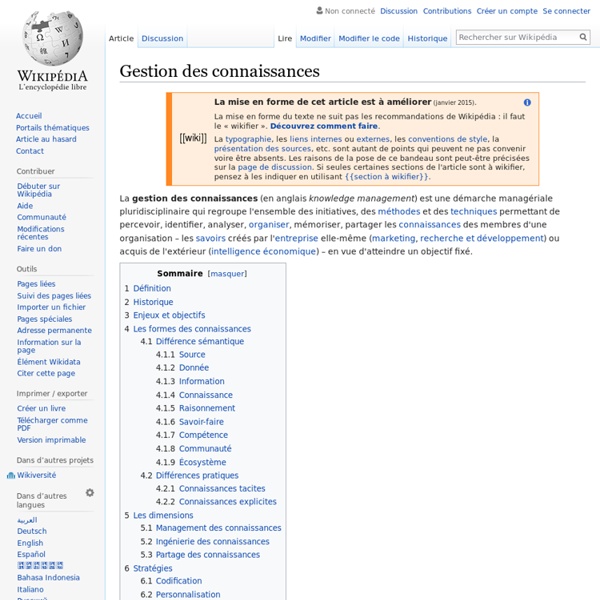



http://fr.wikipedia.org/wiki/Gestion_des_connaissances
Sociology of knowledge The sociology of knowledge is the study of the relationship between human thought and the social context within which it arises, and of the effects prevailing ideas have on societies. It is not a specialized area of sociology but instead deals with broad fundamental questions about the extent and limits of social influences on individual's lives and the social-cultural basics of our knowledge about the world.[1] Complementary to the sociology of knowledge is the sociology of ignorance[2] including the study of nescience, ignorance, knowledge gaps or non-knowledge as inherent features of knowledge making.[3] [4] [5] The sociology of knowledge was pioneered primarily by the sociologists Émile Durkheim and Marcel Mauss at the end of the 19th and beginning of the 20th centuries.
Knowledge intensive business services Knowledge Intensive Business Services (commonly known as KIBS) are services and business operations heavily reliant on professional knowledge. They are mainly concerned with providing knowledge-intensive support for the business processes of other organizations. As a result, their employment structures are heavily weighted towards scientists, engineers, and other experts. Genetic algorithm The 2006 NASA ST5 spacecraft antenna. This complicated shape was found by an evolutionary computer design program to create the best radiation pattern. Genetic algorithms find application in bioinformatics, phylogenetics, computational science, engineering, economics, chemistry, manufacturing, mathematics, physics, pharmacometrics and other fields. Methodology[edit]
A picture is worth a thousand words The expression "Use a picture. It's worth a thousand words." appears in a 1911 newspaper article quoting newspaper editor Arthur Brisbane discussing journalism and publicity.[1] 1913 newspaper advertisement Crowdsourcing Crowdsourcing is a sourcing model in which individuals or organizations obtain goods and services. These services include ideas and finances, from a large, relatively open and often rapidly-evolving group of internet users; it divides work between participants to achieve a cumulative result. The word crowdsourcing itself is a portmanteau of crowd and outsourcing, and was coined in 2005.[1][2][3][4] As a mode of sourcing, crowdsourcing existed prior to the digital age (i.e. "offline").[5]
Applying machine learning or bio-inspired learning techniques to communication networks: Firestation <p class="box warning">JavaScript is disabled in your browser. Please enable to use all features of this website.</p> FIRE News subscription Knowledge representation and reasoning Knowledge representation and reasoning (KR) is the field of artificial intelligence (AI) devoted to representing information about the world in a form that a computer system can utilize to solve complex tasks such as diagnosing a medical condition or having a dialog in a natural language. Knowledge representation incorporates findings from psychology about how humans solve problems and represent knowledge in order to design formalisms that will make complex systems easier to design and build. Knowledge representation and reasoning also incorporates findings from logic to automate various kinds of reasoning, such as the application of rules or the relations of sets and subsets. Examples of knowledge representation formalisms include semantic nets, Frames, Rules, and ontologies. Examples of automated reasoning engines include inference engines, theorem provers, and classifiers.
User-generated content Many commercial websites rely on UGC. For example,Amazon.com and Trip Advisor rely on users to rate products and hotels and restaurants, respectively.[2][3] These reviews are important part of what the two respective websites offer. When UGC is contained in commercial websites it is often monitored by administrators to avoid offensive content or language, copyright infringement issues, or simply to determine relevancy of the content to the site's theme. Because user-generated content is generally free to store, the world's data centers are now replete with exabytes of UGC that, in addition to creating a corporate asset,[4] may also contain data that can be regarded as a liability.[5][6]